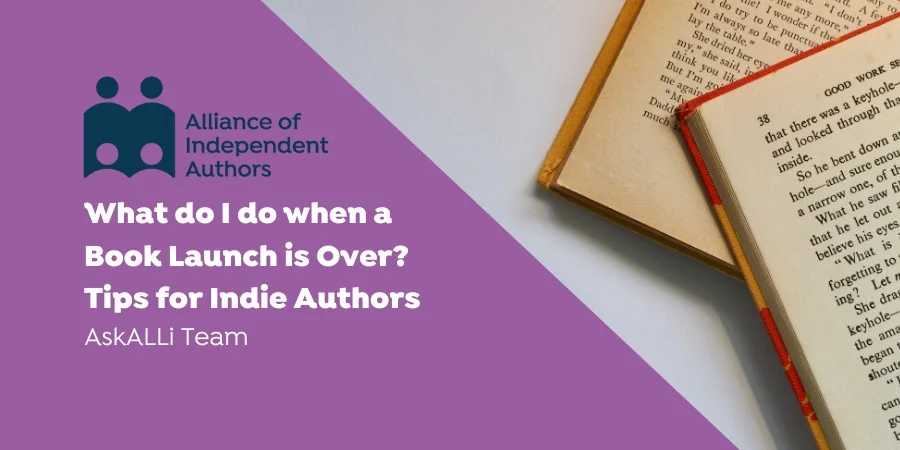
Photo by Jason Leung on Unsplash
Congratulations on publishing your book! As an indie author, the journey doesn't end with hitting “publish.” In fact, it's just the beginning of a new adventure. After a book launch, it's crucial to maintain momentum, build your brand, and lay the groundwork for future success. In this Alliance of Independent Authors blog post, we'll cover key steps you should consider to make the most of your book launch and beyond.
-
Continue Marketing and Promotion
Marketing doesn't end once your book is out in the world; it's an ongoing effort. Some strategies to keep your book in the spotlight include:
- Leverage Social Media: Use platforms like Twitter, Facebook, Instagram, and TikTok to engage with your readers. Share behind-the-scenes stories, snippets from the book, and engage in conversations related to your book's themes. Readers who picked up your book at launch can now engage with you to share their views.
- Host Virtual Events: Organize online book readings, Q&A sessions, or discussions with other authors. These events can be a great way to connect with your audience and continue to generate buzz after the launch is complete. As a published author, now is the time to share your experience and talk about your book while interest is high.
- Run Promotions and Giveaways: Offering discounts, free eBooks, or giveaways can attract new readers and increase visibility. Consider partnering with other indie authors for cross-promotion either through events or newsletters and social media content.
- Utilize Book Reviewers and Bloggers: Continue to reach out to book reviewers and bloggers to request reviews or interviews. Their endorsement can boost credibility and attract more readers.
These are just a few of the ways you can continue marketing after your book launch. For many more tips and ideas, take a look at this ALLi post: The Seven Processes of Publishing: Book Marketing
-
Build Your Author Brand

Photo by Shiromani Kant on Unsplash
Your brand is the unique identity that sets you apart from other authors. After your book launch, now is the time to strengthen your author brand as your profile grows:
- Review and Maintain Your Author Website: Ensure your author website is up to scratch and up to date. It should include an author bio, information about your book or books, links to your social channels and contact details. You may also want to consider a blog as a way to regularly share information about your work.
- Develop a Consistent Style: Use a consistent color scheme, font, and imagery across all your marketing materials. This visual consistency helps reinforce your brand. If you didn’t have time to consider this before launch, take a moment now. Consistency not only creates stronger brand recognition, but saves you time when you are making marketing decisions.
- Share Your Story: Share personal stories or experiences that relate to your books to continue to keep your brand in people’s vision. This could be through your blog, your social media or by collaborating with other authors. This helps readers connect with you on a deeper level and creates a loyal following.
-
Focus on Your Backlist (if you have one)
If you have other published books, or if you're planning to write more, your backlist is a valuable asset. Here's how to make the most of it:
- Cross-Promote Your Books: Mention your other books in the back matter of your latest release, and vice versa. This encourages readers to explore your entire catalogue.
- Bundle Books Together: If you have multiple books in a series or books with similar themes, consider bundling them into a box set. This can attract new readers and increase sales.
- Keep Writing: The best way to build a successful backlist is to keep writing. Consistency in publishing new books keeps readers interested and engaged with your work (see below for maintaining your writing motivation).
-
Grow and Maintain Your Mailing List
A mailing list is a powerful tool for staying in touch with your readers and post-launch is the perfect time to keep growing your list and your fans:
- Offer Incentives: Encourage readers to join your mailing list by offering something in return, such as a free eBook, exclusive content, or early access to new releases.
- Send Regular Newsletters: Keep your subscribers engaged by setting a schedule and sticking to it. Share updates about your writing, upcoming events, your own book recommendations, and more.
- Use Segmentation: As your list grows, you may want to segment your subscribers based on their interests. This allows you to send targeted emails that resonate with specific groups of readers.
You can find out lots more about the power of mailing lists, and easy ways you can start and maintain yours with this recent podcast from ALLi in the Reaching more Readers stand: Five Reasons Why Authors Need an Email List
-

Photo by Myriam Jessier on Unsplash
Monitor Your Sales and Advertising Data
Understanding how your book is performing in the market is key to making informed decisions. By monitoring your sales and advertising data, you can optimize your marketing efforts and identify new opportunities. Top tips for effective data monitoring are:
- Use Analytics Tools: Platforms like Amazon KDP, BookBub, and Draft2Digital provide detailed sales data. Ensure you are familiar with what's on offer, and use these analytics tools to track your book sales, earnings, and trends over time.
- Analyze Your Key Metrics: If you're running ads on platforms like Facebook, Amazon, or Google, pay attention to key metrics like click-through rate (CTR), conversion rate, and return on investment (ROI). This data helps you understand which ads are working and which need adjustment.
- Identify Best-Selling Channels: Determine which sales channels are driving the most revenue and focus your efforts there. For example, if you're seeing higher sales through a specific retailer, consider partnerships or exclusive promotions with that retailer.
- Adjust Your Strategy: Based on your sales and advertising data, you may need to tweak your marketing strategy. Consider reallocating your advertising budget to the most effective platforms and experimenting with different ad creatives or targeting.
For more information on metrics for authors, take a look at this ALLi guest blog post with Ricardo Fayet from Reedsy: Analytics for Indie Authors
-
Keep Writing and Stay Motivated
You may need a break after your recent book launch, and that’s okay. But for most writers there will be a time to write again, and this will take you on journey to your next book launch. Here are some tips to ensure you have the time and motivation to keep creating new content:
- Establish a Writing Routine: Set aside dedicated time for writing each day or week. Consistency is crucial, even if it's just a few hundred words at a time. Having a routine helps you stay on track and keeps your creativity flowing.
- Set Realistic Goals: Break down your writing projects into manageable goals. Whether it's completing a chapter, writing a set number of words, or outlining a new book, achieving smaller goals can build momentum and keep you motivated.
- Join a Writing Community: Being part of a writing group or community can be a great source of encouragement and accountability. You can share your progress, seek feedback, and celebrate each other's successes.
- Stay Inspired: Keep your creative energy up by reading books in your genre, exploring new ideas, and engaging in activities that inspire you. Inspiration can come from unexpected places, so stay open to new experiences.
- Reward Yourself: Celebrate your milestones and achievements, no matter how small. Rewards can be a great motivator, whether it's treating yourself to something you enjoy or taking a well-deserved break.
A day in the life of an indie author after launch – Michael La Ronn
Sci Fi and Fantasy author, Michael La Ronn shares his typical day post-launch, from setting aside writing time, to marketing activity and author outreach…

Michael La Ronn
Launching a book requires all your energy and effort. I find that I do almost everything I need to do during a book launch: cross promos, ad stacking, paid advertising, etc. For this reason, a day in my life post-launch is more about being on the lookout for new marketing opportunities that I missed rather than making a list of daily rituals.
In the morning, I devote my time to writing. Writing is the most important activity I can do in my career. Even if I have a lot of marketing to do, I can't do future marketing if I don't have future books!
I am constantly on the lookout for marketing opportunities. I follow popular writing forums and watering holes where indies hang out. I pay attention to the authors on my social feeds who might mention a book that is similar to mine. I also browse Kickstarter at least once a week to find potential collaborators. I listen to writing podcasts once a week. I always keep my “antennae” up.
Whenever I find an opportunity, I reach out to that author and offer a quick Zoom call so we can get to know each other. Or, I might propose a cross-promo plan that makes it easy for them. Almost all of the time, I find that the other author wants to collaborate. However, sometimes I simply offer to help share their work and ask for their help when I have my next launch. This helps make each of my successive launches bigger.
Views from our ALLi Member Forum
We asked our ALLi Member forum what they focus on after a book launch is over, with some common themes shared below:
Kevin McLaughlin places his focus firmly on his writing
I generally see “the next book” as pretty much the top priority for my time, all the time, every day I am working. NOTHING else moves the needle as far or firmly as another release. Not ads, not emails, not Bookbubs. All of those are good, but that next book? It's rocket fuel.
For my model, getting a series to 6+ books so that I can reliably profit from ad spends is a key part of my strategy, so it's where I place primary focus.
Gary Coulton takes time post-launch to share information with his fans
Having your next book in the machine is important. As is equipping your fans to spread the good word about you and your books.
Conclusion
Launching a book as an indie author is an exciting milestone, but it's just the beginning. By continuing to market and promote your book, building your author brand, focusing on your backlist, maintaining a mailing list and more, you can set yourself up for long-term success.
Keep engaging with your readers, stay consistent with your efforts, and most importantly, keep writing. Good luck on your journey as an indie author!
Thoughts or further questions on this post or any self-publishing issue?
If you're an ALLi member, head over to the SelfPubConnect forum for support from our experienced community of indie authors, advisors, and our own ALLi team. Simply create an account (if you haven't already) to request to join the forum and get going.
Non-members looking for more information can search our extensive archive of blog posts and podcast episodes packed with tips and advice at ALLi's Self-Publishing Advice Centre.





